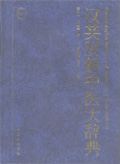|

19.3cm¡Á26.6cm,
1250 pages, 2000,7.
ISBN
7-117-02306-6/R¡¤2307
Author,
Yuan Yixiang.
Published by People's Medical
Publishing House.
 |
Preface
Traditional Chinese Medicine (TCM) is one of the
brightest pearls in the treasure house of the cultural heritage of China. For
thousands of years, it has made a great contribution to the development and
prosperity of the Chinese nation , and the health of the Chinese people. Every
dynasty in the Chinese history witnessed the outstanding achievements and new
break-though in TCM with the development of the society. Since the ancient
times, especially the Han and Tang Dynasties, TCM has been spread all over the
world, especially, in Asia, where the people got great benefit from it. TCM
added its brilliant records to the world's medical history. Its superiority in
the prevention and treatment of diseases is being recognized by the people of
the world and more and more people are learning and studying TCM and favoring
the treatment of TCM. The international exchanges of TCM are even more frequent
than before. In order to conform to the historical trend we are ought to
popularize TCM, a science with great amount of knowledge, more comprehensively
and systematically over the world than our ancestors and serve all the human
beings on our earth. Based on this knowledge we desire eagerly for a
satisfactory dictionary as a too to promote the international exchanges of TCM.
The project of compiling Chinese-English Dictionary of Traditional Chinese
Medicine was initiated by Professor Huang Long of Nanjing Normal University, a
member of the Royal Society of Literature, and Professor Yuan Yixiang of
Changchun College of Traditional Chinese Medicine. The two professors took up
the post of the editor in chief and won the approval of professor Ren Jixue, a
well-known experienced doctor of TCM in China, who was invited to share the post
of the editor in chief. professor Gao Guangzhen was in charge of executive work
as a managing editor. The editorial staff consists mainly of the scholars from
Changchun College of Traditional Chinese Medicine, as well as the Scholars from
Norman Bethune University of Medical Sciences, Nanjing Normal University,
Jiamusi Medica College, Heilongjiang College of Traditional Chinese Medicine,
Liaoning College of Traditional Chinese Medicine, Jilin University of
Technology, Changchun Taxation College, etc. The compiling work began in July,
1990. The dictionary is designed for the
foreigners who are eager to learn TCM and the Chinese who intend to use it as a
tool in their international exchanges of TCM. In addition, the dictionary
collects a large number of the terms of TCM with the detailed interpretations,
which makes the dictionary a necessary reference book for the persons who intend
to learn TCM. In this sense, the dictionary can be considered as one of the
largest reference books which are rare in China. In order to meet the need of
the users and to be distinct from the current dictionaries and libraries of TCM,
this dictionary has the distinctive features as follows"
1. Extensiveness. The dictionary has collects about
9000 terms and expressions in TCM, including more than 20 divisions of TCM, such
as Study of "The Yellow Emperor's Internal Classic", Study of Treatise on
Febrile Diseases, Study of Synopsis of Prescriptions of the Golden Chamber,
Health Preservation, Qigong, Clinics of TCM, etc. with accurate English
translations. This makes the dictionary outstanding from the like.
2. Accuracy. All the selected entries in the
dictionary are chosen by means of the careful research, simplification and
refinement in favour of its users. A great effort has been made to present the
precise interpretations for each entry and the acceptible interpretations are
selected in case of the polysemous ones.
3. Authoritativeness. TCM has a unique theoretical system. Some terms,
therefore, are so abstruse and unintelligible that it is very difficult to find
out the references for translations. Such terms were translated by the English
teachers working in the college of TCM for years, who consulted the authorities
on the subjects to grasp the connotations of the terms sot heat they could
translate them into English properly and accurately. The whole English versions
have been checked by the nationally well-known scholars on translation.
4. Originality and practicality. The dictionary is
laid out originally with Chinese-English entries and interpretations. Indexes of
strokes of Chinese-character, the Chinese phonetic alphabet system and English
alphabet make the dictionary more convenient and practical to its users.
At the moment of completion of the dictionary, we
would like to acknowledge the state Administrative Bureau of TCM, The People's
Medical Publishing House, the Department of Public Health of Jilin Province, the
Administrative Bureau of TCM of Jilin Province, Changchun College of Traditional
Chinese Medicine, etc. For their help and financial supports and the seniors in
TCM for their valuable advice and instructions.
We are very gratified that the compiling plan of
this dictionary is listed in the main publications of the Eighth Five-year Plan
of China by the Press and Publications Administration of the P. R. C.. It is
convinced that the publication of the dictionary will promote the worldwide
popularization of TCM. Although a great
effort has been made by the editorial staff to compile and revise the
manuscript, the dictionary is inevitable to be somewhat imperfect since we lack
the experience in compiling such a large dictionary. Therefore, the valuable
suggestions and criticism are sincerely invited from the scholars at home and
abroad and these imperfections will be revised in the second edition. |
|